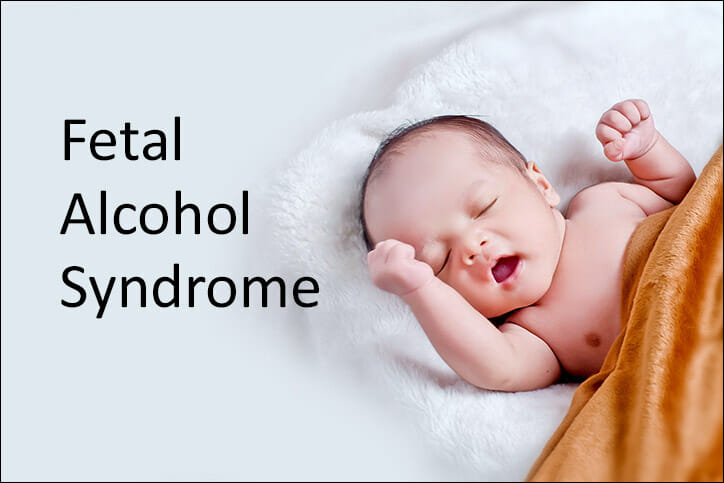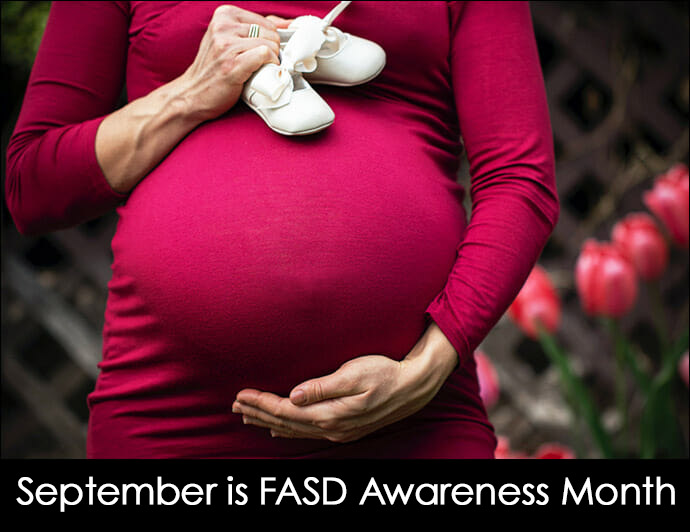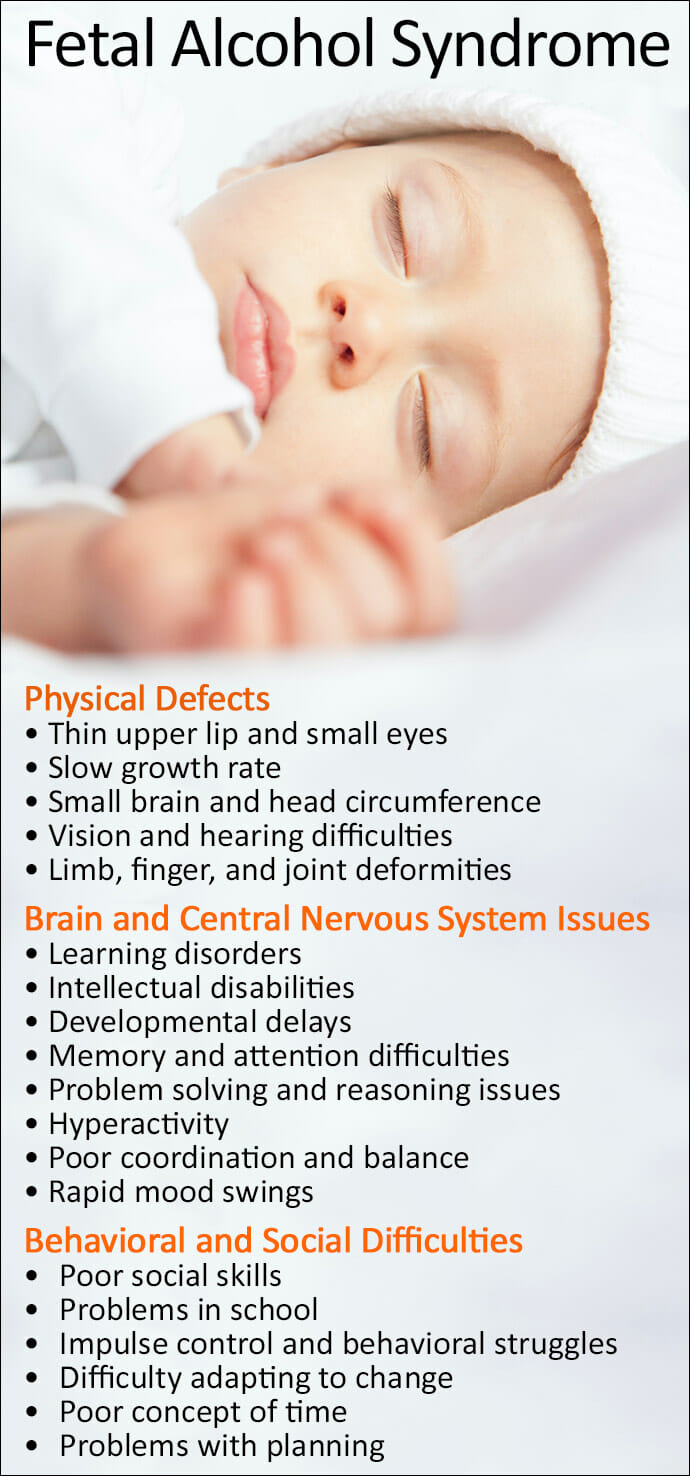Table of Contents
Fetal Alcohol Syndrome (FAS) is a condition that is associated with a variety of Fetal Alcohol Spectrum Disorders (FASD) and birth defects caused by alcohol during pregnancy.
Most women understand the negative effects of alcohol and the significance of not drinking alcohol while pregnant. Unfortunately, it’s quite common to hear it’s okay to practice moderation and have a drink occasionally.
While many women are able to have a drink once in a while without causing any problems for the fetus, the truth is, any amount of alcohol use can cause fetal alcohol syndrome in the unborn fetus during pregnancy.
It’s simply not worth taking any chances, especially when considering the symptoms of FAS and birth defects caused by alcohol might be a possible outcome.
September is FASD Awareness Month.
Understanding the causes and symptoms of fetal alcohol syndrome is vital for both prevention and seeking appropriate treatment approaches to stop drinking during pregnancy if necessary.
What is Fetal Alcohol Syndrome (FAS)?
The severe end of Fetal Alcohol Spectrum Disorders is Fetal Alcohol Syndrome (FAS), which includes neurodevelopmental disorders combined with birth defects caused by alcohol during pregnancy.
However, not all children who are born with the disorder will exhibit or struggle with all the signs and symptoms of FAS.
The range of consequences from FAS can include some of the following:
- Partial fetal alcohol syndrome can be present when a child shows some of the signs and symptoms of FAS but the criteria for a full diagnosis is not met
- Alcohol-related neurodevelopmental disorder
- Birth defects caused by alcohol
- Alcohol-related behavioral disorders
Alcohol use can cause fetal alcohol syndrome in the unborn fetus and no amount during pregnancy is considered safe for the baby.
It’s never too late to stop drinking alcohol during pregnancy, though it’s best to abstain if you’re trying to get pregnant or even think you may be pregnant.
Causes of Fetal Alcohol Syndrome
Fetal Alcohol Syndrome is caused by drinking alcohol while a woman is pregnant, and higher rates of alcohol consumption during pregnancy increase the risk to the unborn child.
In the early weeks of pregnancy before many women know they are pregnant, the baby’s heart, brain, and blood vessels begin developing.
Alcohol use can cause fetal alcohol syndrome in the unborn fetus in some of the following ways:
- Once alcohol enters the bloodstream of the mother, it crosses over through the placenta and reaches the developing fetus
- Alcohol can then cause problems with oxygen supply and the delivery of proper nutrition
- The body of the fetus metabolizes alcohol much more slowly than the mother’s body, which means the concentration of blood alcohol levels in the fetus can be very high with even small amounts of alcohol consumption
- Exposure to any alcohol while in the womb can harm the organs and tissues of the fetus and may lead to permanent brain damage and FAS symptoms when the baby is born
Some women drink alcohol while they are pregnant because they do not understand the consequences, or they rely on false information that says one or two drinks will not be harmful to the fetus.
Others have an alcohol use disorder and find it difficult or impossible to stop drinking during pregnancy.
A functioning alcoholic may drink regularly and still be responsible in all other aspects of their life, so it doesn’t seem necessary to stop. Deciding to get pregnant is one of the most important reasons to seek help or treatment to stop drinking.
Fetal Alcohol Syndrome Symptoms
The severity of fetal alcohol syndrome symptoms can vary from child to child, though they may include a combination of physical defects, cognitive or intellectual disabilities, and issues of simply dealing with daily life.
Physical defects of FAS symptoms can include some of the following:
- An extremely thin upper lip, small eyes, smooth skin surface between the nose and upper lip, and a short, upturned nose
- Physical growth before and after birth that is slower than healthy babies
- Diminished brain size and head circumference
- Vision and hearing difficulties
- Deformities in the limbs, fingers, and joints
- Heart defects
Issues with the brain and central nervous system as a result of FAS symptoms often include:
- Learning disorders, intellectual disability, and developmental delays
- Memory issues, along with trouble paying attention and processing information
- Difficulties with problem solving, reasoning, and identifying consequences
- Hyperactivity
- Poor coordination and balance
- Rapid mood swings
Behavioral and social difficulties related to fetal alcohol syndrome symptoms are typical, such as:
- Poor social skills or struggling to get along with others
- Problems in school
- Difficulty with impulse control, behavior, and staying on task
- Issues with adapting to change, as well as switching tasks
- Poor concept of time
- Problems planning or working toward a goal
Diagnosis of Fetal Alcohol Spectrum Disorders (FASD)
Fetal Alcohol Spectrum Disorders (FASD) cannot be fully diagnosed until a child is born, though a physician can evaluate the health of the fetus and mother during pregnancy.
It’s incredibly important to be open and honest with the doctor about any and all alcohol consumption during pregnancy because early diagnosis of Fetal Alcohol Spectrum Disorders can improve a child’s ability to function in day-to-day life.
Post-birth, doctors can watch for any symptoms of FAS by monitoring a child’s physical appearance, as well as physical growth, brain growth, and overall development.
If a pediatrician suspects symptoms of FAS may be present, he or she may refer the mother and baby to a neurologist or developmental specialist to further evaluate the child’s cognitive, learning, and language abilities, as well as social or behavioral issues.
Fetal Alcohol Syndrome Treatment
Unfortunately, the physical defects and mental disabilities of fetal alcohol syndrome or any fetal alcohol spectrum disorders are not reversible.
However, if a child is born with symptoms of FAS or birth defects caused by alcohol, early intervention and treatment may be able to help prevent what are referred to as “secondary disabilities.”
Early fetal alcohol spectrum disorder treatment approaches are likely to include a team of physical and occupational therapists, a speech therapist, special education therapist, and psychologist that can help with some issues.
Fetal Alcohol Syndrome Treatment for Disabilities:
- Walking, talking, and social skills
- Medical care for health problems, including heart, vision, and hearing issues
- Programs in school that help address learning and behavioral issues
- Family counseling
As the child ages, additional fetal alcohol syndrome treatments can include:
- Medications to help with issues like depression and anxiety
- Treatment for alcohol and drug abuse if appropriate
- Counseling to address behavioral problems
- Vocational and life skills training
It cannot be stressed enough that alcohol use can cause fetal alcohol spectrum disorders in the unborn fetus and it is entirely preventable by abstaining from all alcohol use during pregnancy.
For women who want to get pregnant, but may be dealing with an alcohol use disorder, seeking alcohol treatment is a necessary step before pregnancy.
An alcohol addiction treatment program should be started way in advance of becoming pregnant because it can take time to recover and learn effective ways to avoid a relapse and remain sober throughout pregnancy.
In many cases, an alcohol detox program is the first step of the recovery process before beginning formal treatment. Alcohol detox can take a week or longer to complete.
Having a child is one of the most important decisions a woman will ever make in her life.
As difficult as it can be for some to abstain from drinking for nine months, it is crucial for the lifelong health of the child and is the only way to prevent fetal alcohol syndrome and birth defects caused by alcohol.
Frequently Asked Questions
Is Fetal Alcohol Syndrome Permanent?
Yes, fetal alcohol syndrome and other forms of fetal alcohol spectrum disorders are permanent.
Even though it is a lifelong condition that affects physical development, cognitive abilities, social skills, and other behaviors, it’s possible to manage many of the symptoms.
The symptoms of FAS will impact each person differently although early intervention and support can improve a person’s quality of life into adulthood.
What is the Difference Between FAS and FASD?
Fetal Alcohol Syndrome (FAS) and Fetal Alcohol Spectrum Disorders (FASD) are both types of birth defects caused by alcohol use during pregnancy.
FASD is a large group or spectrum of alcohol-related disorders and fetal alcohol syndrome (FAS) is the most severe form of the spectrum.
Other forms of FASD disorders include alcohol-related birth defects (ARBD), partial fetal alcohol syndrome (pFAS), and alcohol-related neurodevelopmental disorder (ARND).
Since FAS is the most severe type, it usually has the most distinct characteristics, such as growth deficiencies, specific physical and facial features, and cognitive difficulties.
How Much Alcohol Causes Fetal Alcohol Spectrum Disorders?
There is no known amount, frequency, or timeline of alcohol use during pregnancy that is used as a guideline for developing FASD.
Some women are able drink throughout their full-term without any issues, while others might only drink a minimal amount in the beginning and still be affected.
Because each person is different, medical professionals advise that no amount of alcohol is safe to drink while pregnant to ensure the health of the baby and avoid alcohol-related birth defects.
The good news is Fetal Alcohol Spectrum Disorders are completely preventable by not drinking any alcohol during pregnancy.
Is Fetal Alcohol Syndrome Genetic?
Fetal Alcohol Syndrome is not a genetic condition, meaning it is not directly inherited, and it is caused primarily by alcohol use during pregnancy.
With that said, genetics can play a role by increasing the risk factors of the fetus developing FAS if the mother consumes alcohol during pregnancy.
Genetic features of the mother related to alcohol processing, metabolism, and other factors may increase or decrease the susceptibility of the fetus to developing fetal alcohol syndrome as well as the severity of the condition.
How Common is Fetal Alcohol Syndrome?
According to the CDC, the estimates of children in the United States with Fetal Alcohol Syndrome could be as high as 6 to 9 out of 1,000 children.
For all forms of Fetal Alcohol Spectrum Disorders, the number is much higher with approximately 1 to 5 per 100 children, or 1-percent to 5-percent of school-aged children.
Is There a Cure for Fetal Alcohol Syndrome?
No, there is no cure for fetal alcohol syndrome, and it is considered a permanent condition that cannot be reversed.
It can be managed through treatment approaches like physical, occupational, behavioral, and speech therapy approaches.
There are no medications available to directly treat the condition, although certain types of medication may be effective for treating some of the symptoms.
Can Adults Be Tested for Fetal Alcohol Syndrome?
Yes, it is possible to diagnose adults with fetal alcohol syndrome.
Instead of using a single test, medical professionals will review a person’s medical history, along with a physical, behavioral, and cognitive assessment.
It is often easier to diagnose FAS in early childhood, but a valid assessment can also be performed for adults.
A diagnosis is often performed by a number of specialists working together including a medical doctor, occupational therapist, and psychologist.





